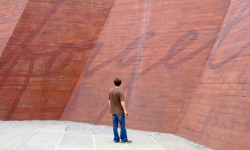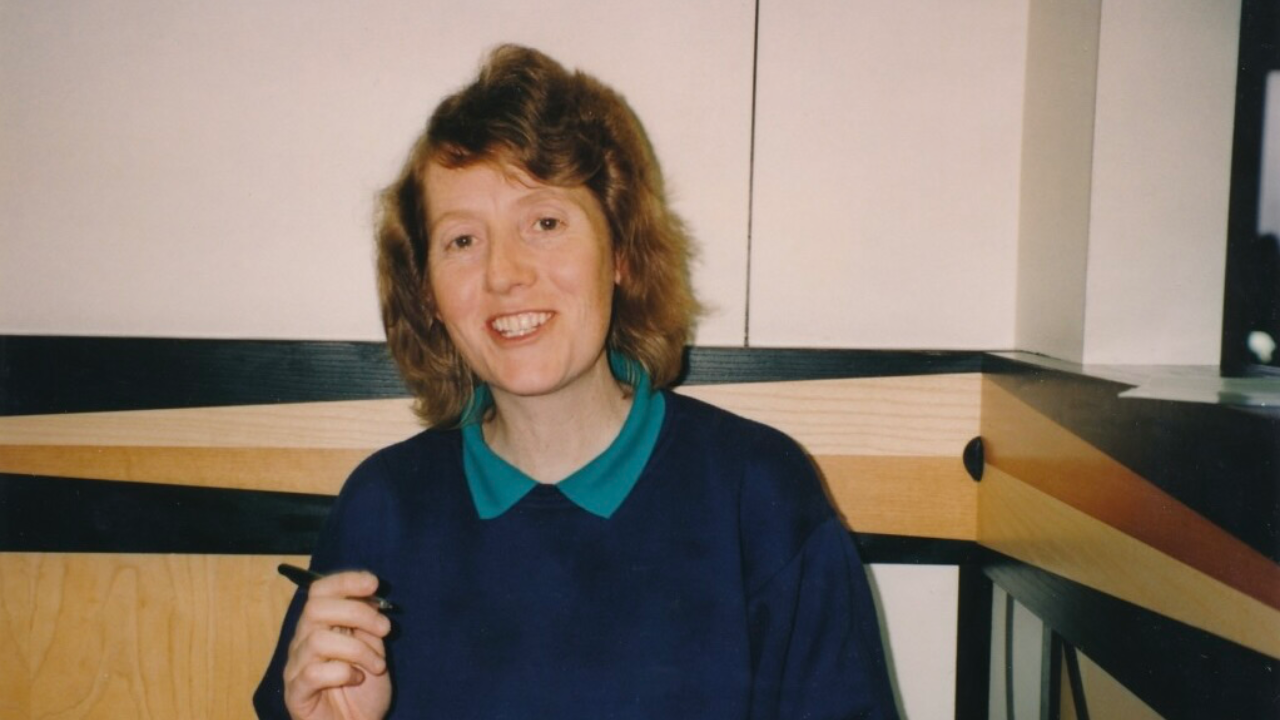
Merrilyn was best known for her work among youth in her local church, regionally, and nationally. She was greatly loved and looked up to by many youths and adults.
Merrilyn Withers had to stick up for and think for herself early in adult life. For example, as a young high school teacher of English, French and History at Warnambool High School in Victoria, Australia, she had taken on leading the youth group in her Methodist church. She decided she wanted to receive believer’s baptism and asked for and received this from the local Baptist minister. Wonderfully, many of the kids from school came. But her church suspended her membership until she admitted that what she had done was wrong. ‘You may as well cancel it now,’ she told them. Which they did. The cancelled membership dissociated her from the youth group, so the kids went on strike, complete with placards. Then her church, with no one else available, re-instated her as the youth leader… but not as a member.
Merrilyn was born in 1951, second of four children, in a happy, stable family in the small town of Wangaratta, Victoria. Her family attended the Methodist church, though she doubts it influenced them much. The church had little for young people.
‘Perhaps that’s why I became so committed to youth work’ Merrilyn says.
However, a team of committed regional leaders ran camps at Christmas and Easter and at one of these she was converted at age fifteen. ‘I wasn’t thinking of becoming a Christian when I went,’ she comments. ‘It was a move of God. For the next eight years I served as a camp leader, wanting to give back something of what I’d received.’
Bible College and Pastoral Beginnings
Already a graduate with a B.A. and Dip Ed from Melbourne University, and after three years of teaching, Merrilyn applied to the Bible College in New Zealand (Laidlaw), wanting a course that was both theological and practical. Suddenly, just a week after she learned that she had been accepted for the study, her father died. She hesitated, but felt God gave her the words from Genesis 12, ‘Leave your country and go to the country I’m leading you to, and there I will bless you and make you a blessing.’ So, she came to New Zealand for the course, and it was not hard to later settle here.
Merrilyn’s first job after graduating with Honours in church history was as Pastoral Assistant at Wellington South Baptist Church, where she ran a church drop-in centre. Opportunities for youth ministry exploded before her and she was soon caring for many young people, including non-churched street kids. Yes! Youth work was her calling and passion.
Once she was invited to a marae. At 9:00pm, at the end of a dark road, her 18-year-old guide took her to a room with rows of machetes! It turned out these were for cutting gorse, but she had wondered! He later visited her office saying, ‘I’m going to kill my stepdad.’ She understood his hostility but tried to help him see beyond his situation. She even offered unlimited MacDonalds’ takeaways. He said, ‘”It’s no use Merr – come and see me in borstal.’ As he walked away, Merrilyn called his name and yelled, ‘Do you want to be wanted for murder?’ He stood and hesitated for a long time, eventually walking back, and saying these words: ‘I’d rather be wanted for murder than never to be wanted at all.’
That conversation was pivotal. Merrilyn determined in her spirit, ‘No young person will ever cross paths with me and leave without knowing somebody cared for them.’
She went the second mile, or more, for these young people. Somebody asked, ‘What made young people like and trust Merrilyn?’ It seems the answer was simply that she loved them.
A Hundred Dollars and an Office
After spending two years at her first church, Merrilyn recognised that circumstances weren’t allowing her to wholly fulfil the calling she felt to youth work. After resigning, she next worked for a year as a volunteer in the national youth scene under Bev Holt, who inspired her greatly.
At a conference, late in 1981, an acquaintance said they needed a youth director in Christchurch. ‘I’d do it for you. Give me a hundred dollars a week and an office,’ Merrilyn laughed in a throw-away remark. Three weeks later they rang her saying, ‘We’ve got an office and two hundred dollars. Will you come?’. She went and after only three months they called her as the full-time Canterbury-Westland Youth Director, a position she enjoyed for six years.
In 1987 Merrilyn went to the USA to attend a youth conference, and to do some postgraduate study at Fuller Theological Seminary for six months. Her sister Dawn joined her to backpack in South America for a few months the following year, which they loved and found rejuvenating. They experienced climbing Mayan pyramids, floating down the Amazon, and… being held up at gunpoint in Peru. They went again some years later, and took young people on mission trips to India, Bangladesh, and the Philippines. They wanted young people to see something of the rest of world, to observe, ask questions, see the reality.
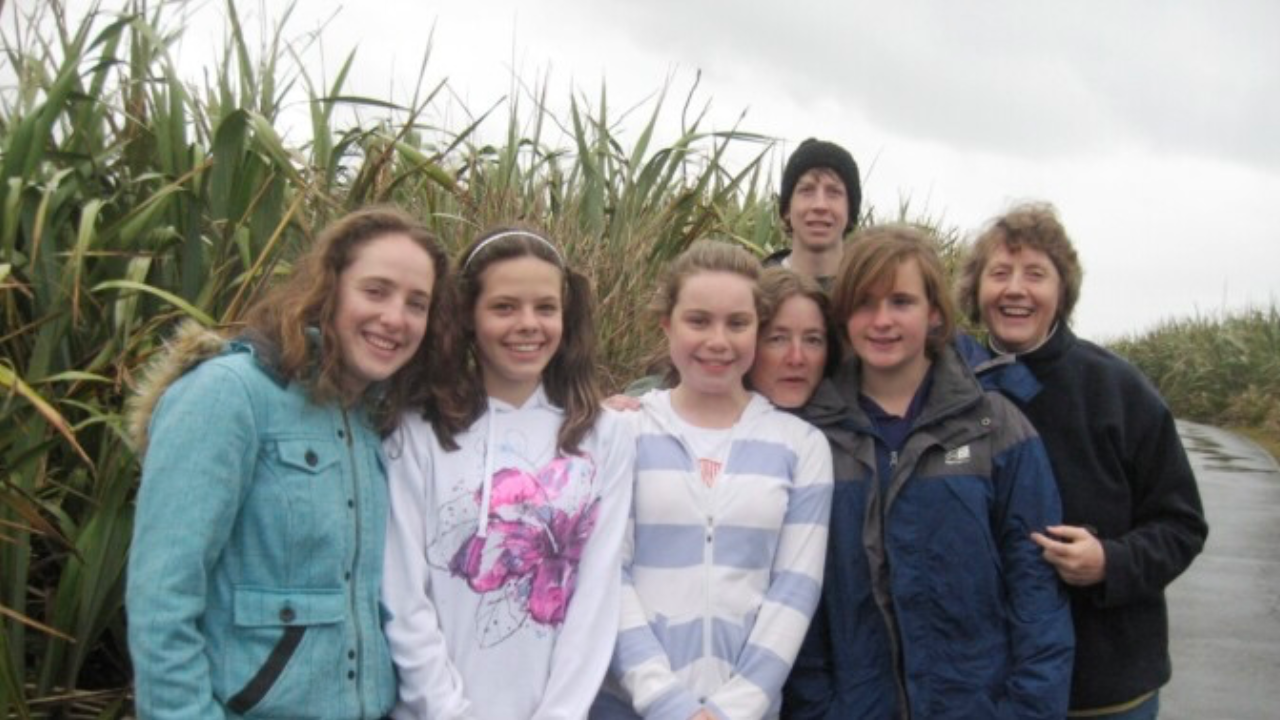
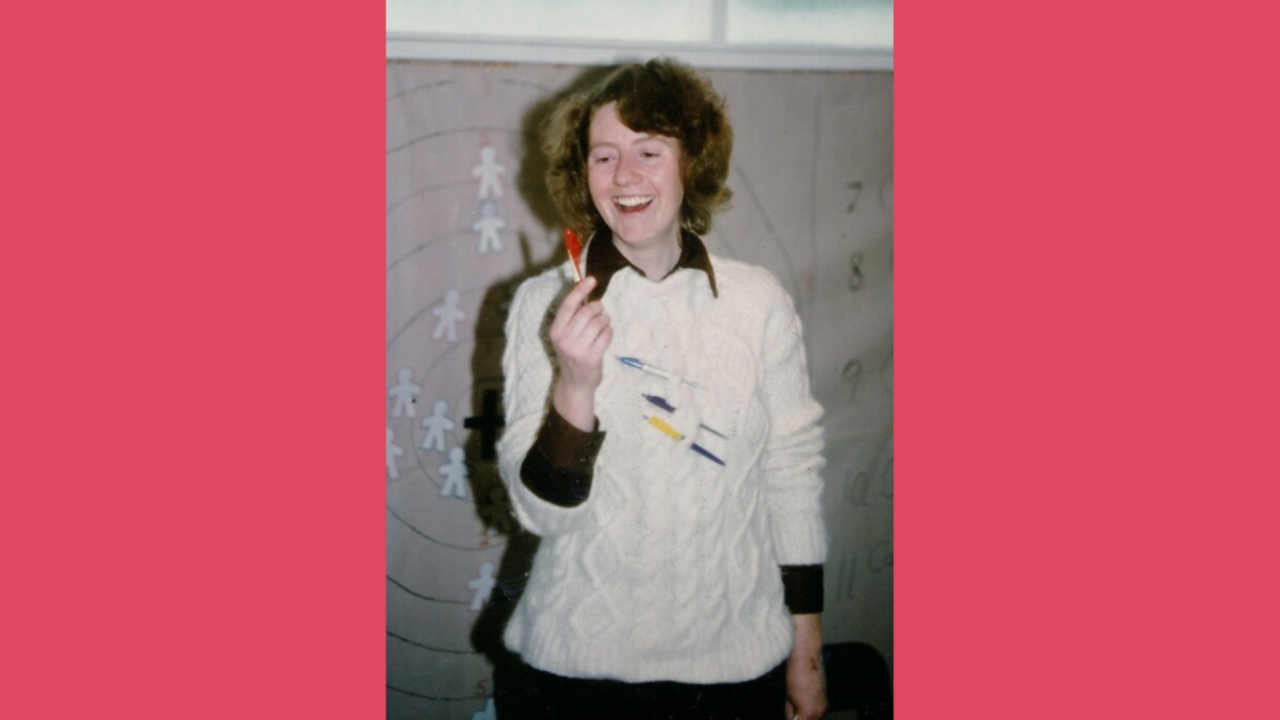
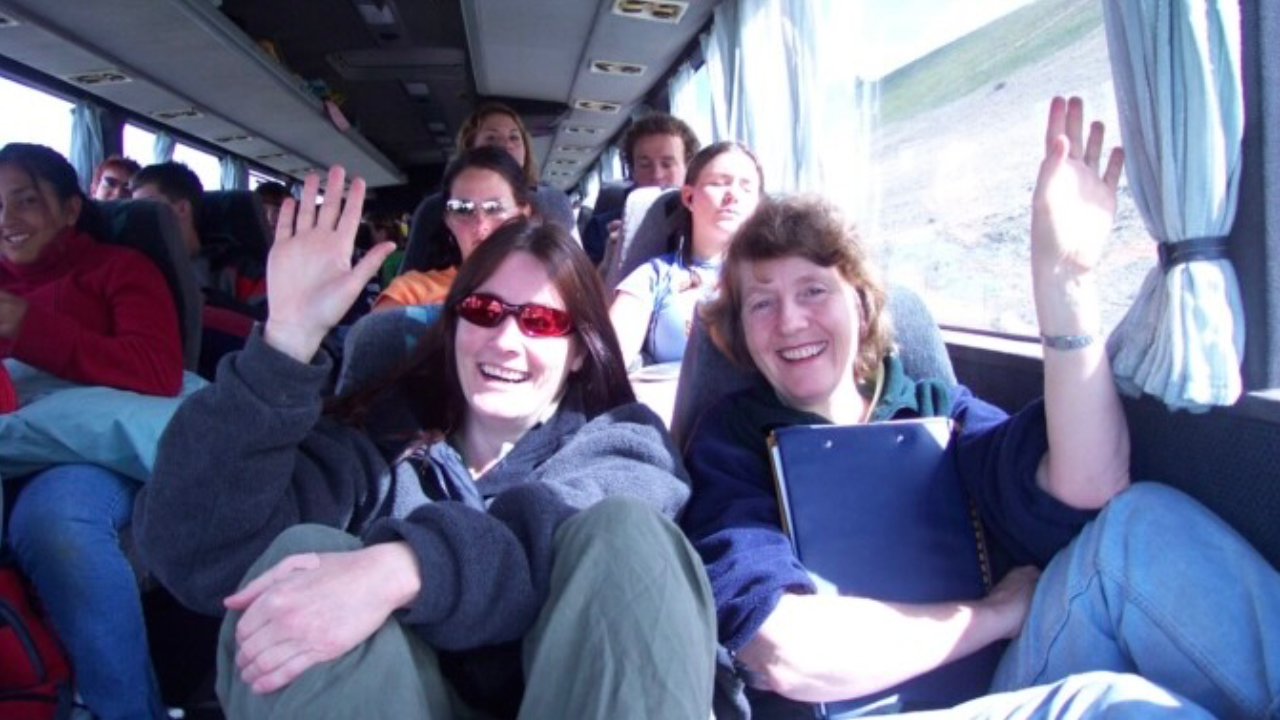
The Question of Companionship
Merrilyn embraced singleness, never feeling ‘incomplete’. She feels that being unmarried enabled her to focus on ministry that she could not have carried out if she was married. She notes that if she was married, she would have wanted children, and the culture of the time did not enable ministry and children. She prayed for spiritual children, and companionship against loneliness: and was granted both. Her sister Dawn, seven years younger, became a very good friend and partner. Dawn had first moved to New Zealand as a youth worker for Avonhead Baptist in 1985. The sisters paired up in enormous support for each other from that time on and bought a house together in the Hutt Valley when Dawn was Lower Hutt youth Pastor and Merrilyn was Wellington regional and national youth leader.
Wellington Youth Leadership
Merrilyn had returned to Fuller for a time, when in 1989, the Wellington Baptist Association invited her to come as their regional Youth Director to facilitate and encourage youth ministry in local churches. Tasks that fell to her included training leaders, running regional events like Easter camps, May and August camps and intermediate camps, offering consultations with church leaders, preaching, Bible studies, providing ideas, materials, and services. Nationally, she was an advisor and spokesperson, with a team of youth advocates from around the country, grappling with issues of modern youth ministry.
It was a highly up-and-down task. One hard part for her was to see the potential for youth ministry, and then not be able to draw in sufficient leaders with the vision to make it happen. At times she felt heart-broken that churches had no youth leaders, or saw youth suffer through division within a church, or saw youth with nobody to bring them to Jesus. In low moments she said, ‘It’s like pushing mud uphill with a rake!’
She echoed the wise words of the Baptist Leader at the time, Rev Ian Brown: ‘Pastors are more in danger of being nibbled to death by ducks than swallowed by pythons,’ and tried to keep the stress at bay by watching movies and knitting.
But many good, positive things were also happening. Youth workers excited about ministry. New youth leaders making a difference. Camps. She loved camps—hard work, but kids’ lives touched and changed. These were the ultimate proof of the value of youth work to her.
One Easter camp, on Good Friday, a team led by Merr (as she was often called) brought in a huge cross made from telegraph poles. They gave each young person a paper with the verse from Isaiah 53, ‘He was pierced for our transgressions.’ ‘Think about it,’ she said, ‘If you know it’s true for you, sign the paper and nail it to the cross.’ By Sunday night, when most of the kids had gone, Merr, exhausted, knelt by the cross to take communion. She was near to tears. ‘When you get lonely or tired or criticised for petty things,’ she noted, ‘you can wonder if it’s all worth it.’ She glanced up at the cross towering above her, and then saw the names—not just Person X, but kids that she knew and loved and had worked with and had seen her youth leaders work with. It felt like God said, ‘Merrilyn, you are doing it for Me. You are investing yourself in these kids’ lives, and ultimately that’s all that counts.’ She knew she could go on, even when shattered in exhaustion.
What made Merr such a good youth pastor?
Asked that question, Merr said, ‘In fact probably Dawn was better at local youth pastoring. She loved the kids hugely and put herself out enormously for them. I had more the task of strategy, planning, training, speaking. In the 1980s and 1990s we had some great synergy round supporting and encouraging youth pastors.’
But it was still a time of opposition to women leading in Baptist ministry. While some who would normally be hostile overlooked her leadership because she was not trying to be a senior pastor, some objected. It was hurtful at times.
Hayden Allen, now pastor in Upper Hutt Baptist, tells of going as a teen to a BYM event in 1994-95, with the default view that women must not lead or preach or teach. He heard Merrilyn speak and felt the effect, so sat there, musing, ‘Okay, God’s clearly using her. I have to examine my parents’ theology about women as leaders.’ He says now, ‘You can’t deny experience. It was like Peter and Cornelius.’ He feels young people could see the love that Merr and Dawn had for young people. It was not a job, but a passion with genuine love for youth. ‘Merr used to say, “People don’t care what you know till they know that you care.” Her teaching changed me. I learned that youth work is a separate field and worthy of specific training. It tended earlier to be either burn out in youth work or grow up and do adult work. Merr made me see youth work with its own calling.’
Heather Ameye-Bevers, a former national youth advisor, commented on Merrilyn’s style of ministry. ‘She had an amazing ability to relate to young people. She told stories of her own teen-age years—hilarious or painful. She had a great sense of humour, fun in her voice, was often self-deprecating, highly relational. In the 1980s there was prayer for youth but not counselling. Merrilyn supplied that. She used cartoons, mirth, revelation. ‘Merr was a gift to us. I hate to think where we’d be in youth work without her.’
And the later times
In later times, Dawn got terminal cancer, dying in 2012. This marked the hardest time for Merrilyn. As she nursed Dawn, Merrilyn felt she walked in darkness and could not always feel God close. Exodus 20:21 was significant to her: God was found by Moses in the thick darkness.
There are hard times now, too, Merrilyn faces a growing neurological disorder and holds on to God. ‘I will never leave you nor forsake you,’ are words that keep her going, along with the love and support of others.
Merrilyn is now semi-retired in Lower Hutt, still involved in youth ministry such as speaking, running a discipleship camp, and volunteering in her local youth group. ‘People come up to me in a supermarket and thank me for the help given 30 or 40 years ago. I mostly recognise them among the thousands of names I memorised. I look into the adult eyes of kids I knew. It’s hard concerning those who have not keep the faith. But I live with gratitude.’
We suspect there are thousands who are grateful for Merrilyn.
Sources
NZ Baptist, April 1995
Interview with Merrilyn, 18.1.2022,
Interviews with people who saw Merrilyn’s work
